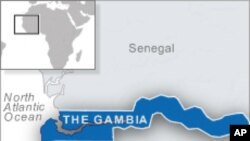The leader of Gambia’s opposition People's Progressive Party says the government’s use of the death penalty is not likely to deter criminals.
Omar Jallow called on religious groups and civil society organizations to put pressure on President Yahya Jammeh’s administration to stop the use of capital punishments in the West African country.
“I don’t believe in capital punishment because I believe it is inhuman [and] it’s not a deterrent to stop people from committing heinous crimes,” said Jallow.
In a nationwide television broadcast to mark the celebration of Eid-al-Fitr, President Jammeh said his administration will impose the death penalty on those convicted of committing murder.
Jammeh was quoted as saying that “by the middle of next month [September], all the death sentences would have been carried out to the letter. There is no way my government will allow 99 percent of the population to be held to ransom by criminals.”
“All punishments prescribed by law will be maintained in the country to ensure that criminals get what they deserve,” Jammeh said. “My government will take whatever legal action is necessary to expunge these deadly and heinous acts from the country.”
But, opposition leader Jallow questioned the timing of President Jammeh’s statement, saying the feast of Eid-al-Fitr is a time for clemency and pardon, but not for execution.
“The president has chosen a very wrong day for Muslims to make such a statement. Eid-al [Fitr] is a day for forgiveness and a day where all difficulties are to be resolved. We should use it all the time for peace-building among members of families and communities,” said Jallow.
He called on civil society groups and religious leaders to urge Jammeh to stop enforcing the death penalty.
“All Gambians including our religious leaders and political leaders and people who lead non-governmental organization and civil society organizations should put pressure on him so that such statements and such acts will not be carried ahead and [that] there would be no executions in the Gambia,” said Jallow.
In its 2011 annual report, Amnesty International said “the government continued to restrict political freedom, stifle freedom of expression and commit human rights violations with impunity.
“Members of the National Intelligence Agency [NIA], army, police, and shadowy militias close to the President - known as ninjas, drug boys and jugglers - arbitrarily arrested and detained government opponents, human rights defenders, journalists and former security personnel,” the Amnesty report continued. “Torture and other ill-treatment in custody were reported. A second wave of mass arrests took place, culminating in the treason trial of eight prominent men, who were sentenced to death after a grossly unfair trial.”
Omar Jallow called on religious groups and civil society organizations to put pressure on President Yahya Jammeh’s administration to stop the use of capital punishments in the West African country.
“I don’t believe in capital punishment because I believe it is inhuman [and] it’s not a deterrent to stop people from committing heinous crimes,” said Jallow.
In a nationwide television broadcast to mark the celebration of Eid-al-Fitr, President Jammeh said his administration will impose the death penalty on those convicted of committing murder.
Jammeh was quoted as saying that “by the middle of next month [September], all the death sentences would have been carried out to the letter. There is no way my government will allow 99 percent of the population to be held to ransom by criminals.”
“All punishments prescribed by law will be maintained in the country to ensure that criminals get what they deserve,” Jammeh said. “My government will take whatever legal action is necessary to expunge these deadly and heinous acts from the country.”
But, opposition leader Jallow questioned the timing of President Jammeh’s statement, saying the feast of Eid-al-Fitr is a time for clemency and pardon, but not for execution.
“The president has chosen a very wrong day for Muslims to make such a statement. Eid-al [Fitr] is a day for forgiveness and a day where all difficulties are to be resolved. We should use it all the time for peace-building among members of families and communities,” said Jallow.
He called on civil society groups and religious leaders to urge Jammeh to stop enforcing the death penalty.
“All Gambians including our religious leaders and political leaders and people who lead non-governmental organization and civil society organizations should put pressure on him so that such statements and such acts will not be carried ahead and [that] there would be no executions in the Gambia,” said Jallow.
In its 2011 annual report, Amnesty International said “the government continued to restrict political freedom, stifle freedom of expression and commit human rights violations with impunity.
“Members of the National Intelligence Agency [NIA], army, police, and shadowy militias close to the President - known as ninjas, drug boys and jugglers - arbitrarily arrested and detained government opponents, human rights defenders, journalists and former security personnel,” the Amnesty report continued. “Torture and other ill-treatment in custody were reported. A second wave of mass arrests took place, culminating in the treason trial of eight prominent men, who were sentenced to death after a grossly unfair trial.”





